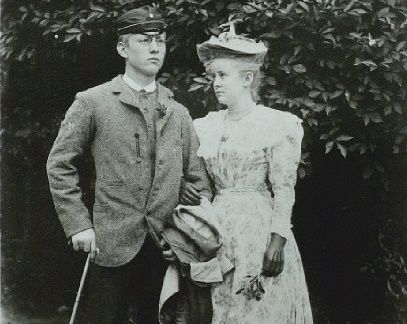There were more children than animals in the home of district veterinarian Hans Jensen and his wife, Marie Kristine, in tiny Farsø in the Himmerland region of Jutland by the time their second-born son, Johannes, reached the age of ten in 1883.
His sister, Maria Kristine Dorothea – known to all as simply ‘Thit’ – was three years his junior, but as the eldest girl of the flock, she was rapidly given the role as extra mum in a household where actual mum spent two decades either pregnant or breast feeding. With her lesson in the division of labour learned at such an early age, it’s not surprising that she went on to become a staunch advocate of women’s rights.
Sibling rivalries are common in most families, and though Thit was attentive to all of her 10 brothers and sisters, acting as teacher for the youngest ones during her teenage years, big brother Johannes was the one person she looked up to as both her equal and a competitor. Set apart from the flock of farmers and craftsmen, they were two academically-minded souls looking to the dawn of a new century to broaden their horizons and see a little more of the world than Himmerland.
That was Thit
It’s hard enough for such humble beginnings to produce minds brilliant enough to be Nobel Prize winners, but incredibly the Jensen family managed to produce two of the greatest Danish writers of the 20th century.
Thit Jensen’s extensive career as a novelist began shortly after she left the family home aged 22 to make her fortune in Copenhagen, which followed quickly with the success of ‘Two Sisters’ in 1903. From then on there was no stopping her, and over the period 1903-28 she managed to produce one novel a year.
Her book ‘Gerd’, from 1918, was given the tagline “The 20th century woman”. It was possibly her finest female portrait: a vivid creation of a motherless priest’s daughter from a small island off the coast of Jutland. In addition to her novels, Thit Jensen was also a devoted women’s rights campaigner, writing essays as well as lecturing on the topic. Her interest in spiritualism is not quite as commemorated.
Not much brotherly love
While big brother Johannes was also a keenly ambitious and prolific writer, in content and outlook they differed sharply. Something of a male chauvinist and committed Darwinian, Johannes scorned upon weakness and once suggested during a debate with fellow writer Herman Bang that all homosexuals ought to be put behind barbed wire and fitted out with knitted clothes.
With little sister Thit busy founding the Organisation for Women’s Sexual Enlightenment in 1924, family dinners with the Jensens were more likely fascinating food for the imagination than the palate. From inspiring one another in their youth, Johannes and Thit could no longer tolerate one another’s presence.
Thit Jensen’s interest in spiritualism started with her somewhat eccentric father, who taught both children himself and often invited clairvoyants into the family home. While her fascination with the occult remained with her throughout her life, the field of parapsychology was something that big brother Johannes also found himself looking into, although as a well-known free-thinker and positivist, he never shouted too loudly about it.
Missing out on Stockholm
Johannes V Jensen’s career was equally as prolific as his sister’s. A novelist, poet, essayist and correspondent, he attempted to depict how human development was guided by an idealised Darwinian theory.
The bulk of his novels were historical in theme, and his early works are generally set in the Himmerland of his childhood: a region he had left in 1893 while Thit was still teaching her brothers and sisters. His medical studies at the University of Copenhagen lasted from 1893 to 1898 and heavily influenced his literature.
In 1944, he won the Nobel Prize for literature, a year when World War II prevented the award ceremonies from being held as usual in Stockholm. His success seemed to do nothing to put off Thit, whose own writings went from historical themes to her own internal conflicts. While Johannes died in Copenhagen in November 1950, she outlived her brother by seven years, and is buried in Bagsværd in the northern suburbs of the capital.
















